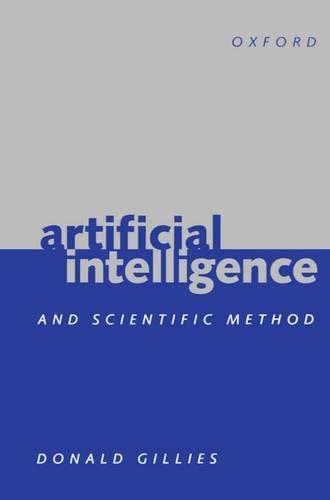Overview
Artificial Intelligence and Scientific Method examines the remarkable advances made in the field of AI over the past twenty years, discussing their profound implications for philosophy. Taking a clear, non-technical approach, Donald Gillies focuses on two key topics within AI: machine learning in the Turing tradition and the development of logic programming and its connection with non-monotonic logic. Demonstrating how current views on scientific method are challenged by this recent research, he goes on to suggest a new framework for the study of logic. Finally, Professor Gillies draws on work by such seminal thinkers as Bacon, Gödel, Popper, Penrose, and Lucas to address the hotly contested question of whether computers might become intellectually superior to human beings.
Full Product Details
Author: Donald Gillies (Professor of the Philosophy of Science and Mathematics, Professor of the Philosophy of Science and Mathematics, King's College, London)
Publisher: Oxford University Press
Imprint: Oxford University Press
Dimensions:
Width: 14.40cm
, Height: 1.60cm
, Length: 22.50cm
Weight: 0.346kg
ISBN: 9780198751588
ISBN 10: 0198751583
Pages: 190
Publication Date: 05 September 1996
Audience:
Professional and scholarly
,
Professional & Vocational
Format: Hardback
Publisher's Status: Active
Availability: To order

Stock availability from the supplier is unknown. We will order it for you and ship this item to you once it is received by us.
Reviews
`crisp, clear and concise' THES `An old-fashioned monograph: tightly argued, heavily referenced.' New Scientist `This is an original and very interesting book ... it is obviously a good place to start for anyone who would like to examine the notions of logic and scientific method in the light of recent developments in artificial intelligence.' Peter Ohrstrom, Aalborg University `if you are not a philosopher this book is worth reading - but for interest alone ... If you know any philosophers, however, you should make sure they read it.' Mike James, Scientific Computing World, June 1997 'offers an interseting view on recent developments in AI, particularly in machine learning, form a philosopher's perspective. the book is of value to all AI practioneers' Zentralblatt Math
crisp, clear and concise THES An old-fashioned monograph: tightly argued, heavily referenced. New Scientist This is an original and very interesting book ... it is obviously a good place to start for anyone who would like to examine the notions of logic and scientific method in the light of recent developments in artificial intelligence. Peter Ohrstrom, Aalborg University if you are not a philosopher this book is worth reading - but for interest alone ... If you know any philosophers, however, you should make sure they read it. Mike James, Scientific Computing World, June 1997 'offers an interseting view on recent developments in AI, particularly in machine learning, form a philosopher's perspective. the book is of value to all AI practioneers' Zentralblatt Math
Author Information
Donald Gillies is Professor of the Philosophy of Science and Mathematics at King's College, London. His books include An Objective Theory of Probability (1973), Revolutions in Mathematics (1992), and Philosophy of Science in the Twentieth Century (1993). He was the editor of the British Journal for the Philosophy of Science from 1982 to 1985.



